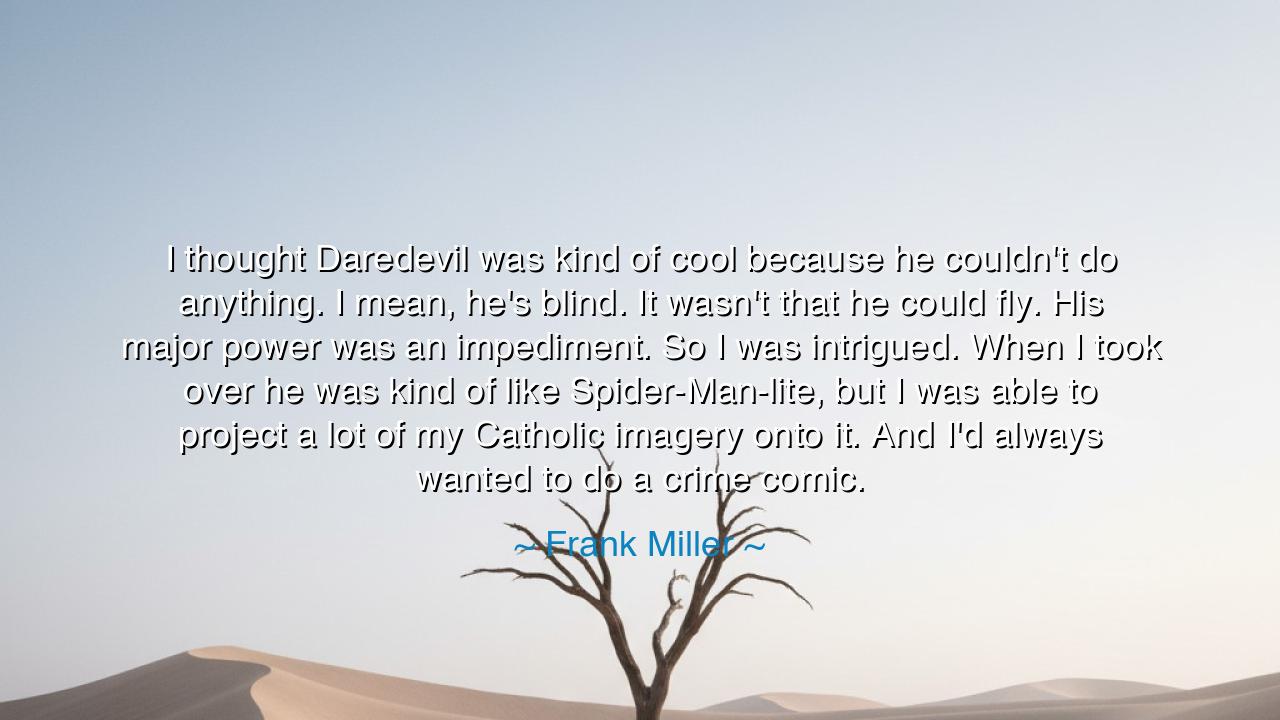
I thought Daredevil was kind of cool because he couldn't do
I thought Daredevil was kind of cool because he couldn't do anything. I mean, he's blind. It wasn't that he could fly. His major power was an impediment. So I was intrigued. When I took over he was kind of like Spider-Man-lite, but I was able to project a lot of my Catholic imagery onto it. And I'd always wanted to do a crime comic.






"I thought Daredevil was kind of cool because he couldn't do anything. I mean, he's blind. It wasn't that he could fly. His major power was an impediment. So I was intrigued. When I took over he was kind of like Spider-Man-lite, but I was able to project a lot of my Catholic imagery onto it. And I'd always wanted to do a crime comic." These words spoken by Frank Miller reveal a profound insight into the nature of struggle, overcoming limitations, and the power of adversity. Here, Miller speaks not of a hero blessed with grand and flashy powers, but of a hero whose strength comes not despite his disabilities, but because of them. Daredevil is not just a man with enhanced senses—he is a reflection of the human condition, where perceived weaknesses can become the very source of our greatest power.
In the ancient world, many myths and stories were born from the notion that heroes were forged not by their perfection, but by their flaws. Odysseus, though celebrated for his cunning, was also a man of faults—proud, often quick-tempered, and at times overly ambitious. But it was through his imperfections and the trials he endured that he became a hero. Similarly, Daredevil, though blind, is not a figure of tragedy, but one of resilience. His blindness—once perceived as a handicap—is transformed into his strength, a reminder that our greatest abilities often emerge from our most profound limitations.
This concept of limitation leading to empowerment is rooted deeply in the ancient traditions of heroism. Take, for instance, the tale of Hercules, the great hero who was cursed with impossible tasks. He did not gain greatness by avoiding hardship, but by confronting it head-on. His legendary strength came from his ability to persevere in the face of what others considered insurmountable. Similarly, Daredevil’s blindness is not something to be overcome by gaining the power to see, but by using his remaining senses—by adapting, and in doing so, finding a strength that no ordinary man could ever possess.
Miller’s embrace of Catholic imagery and crime elements within Daredevil is significant, for it reflects an age-old narrative of redemption and the struggle between good and evil. Throughout history, religious imagery has often been intertwined with heroism, with the divine and the damned playing roles in shaping the human soul. In Christian theology, the concept of suffering as a path to redemption is central, much like the plight of Daredevil. He is both a sinner and a savior, navigating the streets of Hell’s Kitchen, where the struggles of humanity are laid bare. Just as Christ carried the weight of mankind's sins, Daredevil bears the weight of his blindness, and through it, he seeks justice.
Consider the ancient idea of the wounded healer. In many cultures, the greatest healers were those who had suffered their own wounds. Chiron, the centaur from Greek mythology, was known as a healer despite being wounded by a poisoned arrow. His ability to heal others came not from his perfection but from his own pain and understanding of suffering. Daredevil, much like Chiron, becomes a symbol not of invincibility, but of healing through the very things that would otherwise break him. His blindness allows him to see the world in a way that others cannot, offering a deeper empathy for the suffering of others.
Miller’s approach to Daredevil thus offers us a vital lesson—that true strength is not born from the absence of flaws, but from our ability to embrace them and turn them into something greater. In our own lives, we often look at our challenges—our weaknesses, our fears, our struggles—and wish they would disappear. But as Miller points out, it is often in these very imperfections that our true potential lies. Just as Daredevil learned to wield his blindness as a weapon, so too can we learn to use our struggles to find strength, purpose, and meaning in ways we never imagined.
Action can be taken by understanding that growth comes not from the elimination of our limitations, but from learning to navigate them, to adapt and evolve. Like Daredevil, who moves with precision and grace despite his blindness, we can find clarity even in the darkest moments. Our challenges are not barriers; they are the training grounds for our greatness. The next time we face an obstacle, let us remember that it is not our weaknesses that define us, but our capacity to transform them into sources of power, empathy, and understanding.






AAdministratorAdministrator
Welcome, honored guests. Please leave a comment, we will respond soon